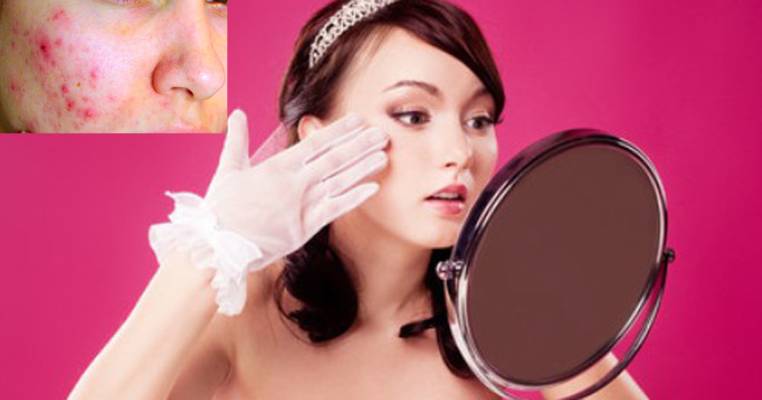 75% of people with
rosacea feel the condition has affected their self-esteem. Rosacea is a disorder of
your facial skin. While it is similar to acne, it is distinctly
different and is characterized by some or all of
the following indicators:
75% of people with
rosacea feel the condition has affected their self-esteem. Rosacea is a disorder of
your facial skin. While it is similar to acne, it is distinctly
different and is characterized by some or all of
the following indicators:
- Redness on your cheeks, nose, forehead and/or chin
- Small but obvious blood vessels on your face Facial pimples
- Watery, irritated or bloodshot eyes
Other warning signs to look for include:
- Burning, stinging, itching or a feeling of tightness in your face
- Rough, dry appearance
- Raised red patches
- Facial edema (swelling)
The condition isn’t life threatening, but it can certainly be life altering due to its effect on your personal appearance. According to the National Rosacea Society, over 75 percent of people with rosacea feel the condition has affected their self-esteem. Many rosacea sufferers are uncomfortable in public settings and avoid social activities. Among those with the most severe symptoms, a majority feel rosacea has adversely impacted their professional careers, and almost half of that group has missed work due to their condition.
Who Has it and Who is Most Likely to Get it?
Rosacea is seen more often in northern and eastern European countries like Ireland, than in the U.S. It is most common in fair-skinned people, but you can develop the condition regardless of your skin color. If you’re fair-skinned with a tendency to blush or flush easily, you’re at higher risk. The disorder is more common among women.
The target age to develop the condition is ages 30 to 60 and the number of rosacea sufferers is on the rise. You know it’s a widespread condition when major cosmetic companies are marketing products specifically designed to conceal redness.
Possible Causes Of The Disorder
The underlying cause of rosacea has remained a mystery within the mainstream medical community, however, theories abound.
One theory suggests the condition may be the result of oversensitive blood vessels in your face. Another theory attributes the disorder to mites (Demodex folliculorum) which naturally live on your skin. Rosacea sufferers have more of these mites than people without the condition. Genetics (family history) may play a role. There may even be a connection between rosacea and a stomach infection caused by the H. pylori bacteria.
Most likely however is that it is caused by a dysfunction of your immune system, like an auto immune condition. Here in lies the solution.
Treatment
While conventional medicine has been writing prescriptions for antibiotics, topical ointments, Accutane and other harmful pharmaceuticals to help alleviate the symptoms of rosacea, the key is to treat the underlying cause of the condition. Like all autoimmune conditions the gut microflora is vital important to rectify and in this case the hormones need to be addressed too, and also then considering the symptomatic treatment.
Herbal Medicine
A formula combination of herbal medicine in tincture or capsule form can have a profound effect on rosacea. Combining Vitex agnus castus to balance the hormone axis with Berberus vulgaris as a natural antimicrobial and Astragalus to address a malfunctioning immune response. Also worth adding to the formula is liver tonics Taraxacum officinalis or milk thistle to aid the elimination of excess hormones or toxins that may exacerbate the condition.
The formula should be taken for at least 90 days before fully clinically assessing the success, improvement should be seen before this however.
Nutrition
The nutrition recommendation focuses primarily on enhancing and modifying the eco system of the gut microflora.
- Probiotics and lacto-fermented foods are important.
- Eliminating sugar and reducing grains is very important also.
You will want to normalize your insulin levels and one of the best ways to do this is make certain your intake of foods that will raise them like, sugar, bread, pasta, rice, corn and potatoes are kept low. Ideally it would be best to measure your fasting insulin level to determine if you are eating inappropriate amounts of these foods. Ideally your fasting insulin level should be 3 or lower.
- Eliminate Trans Fat and Processed Foods
Most people don’t realize that most of the fats in your skin cell membranes are exclusively omega-6 fats. If you consume processed foods that are loaded with damaged omega-6 fats, they will be incorporated into your cell membrane and predispose that skin cell to an increased risk of diseases like rosacea and skin cancers. You should make certain that you have a good source of omega-6 fat from organic pumpkin, sesame, or sunflower seeds, or their cold pressed oils
- Optimize Your Sun Exposure and Vitamin D Levels
When you have appropriate levels of vitamin D, your body will produce over 200 antimicrobial peptides to fight any infection in your body. If for whatever, reason you are unable to receive regular sun exposure, then you will want to take a high quality vitamin D supplement and measure your vitamin D level so it is around 120-150 mmol/L (50-70 ng/ml)
Lifestyle
- Control Emotional Stress
Uncontrolled emotional stress can seriously compromise your immune system. Stress is also a trigger for rosacea flare ups if you already suffer from the disorder. Meditation, stress management techniques, breathing exercises, physical exercise etc
- Reduce Triggers.
For a period of time to reduce the severity of the conditions during a flare up: Avoid high temperatures and low temperatures. Reduce chemical exposure via cosmetics, perfumes, hair dyes etc. Avoid stressful events. Avoid stimulants and ensure good quality sleep.
In Health,
Gabriel




 Follow me on facebook
Follow me on facebook